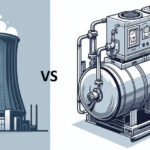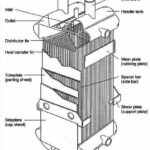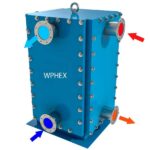Distillation columns versus separators. Both used for separating and purifying liquids, but they differ in terms of the type of separation they perform and the methods they use.
A distillation column is a large, tall vessel used in the chemical and petrochemical industries to separate a mixture of liquids into its individual components based on their boiling points. This is accomplished through a process called distillation, where the mixture is heated to produce vapor, and then cooled to condense the vapor into separate components. The distillation column is equipped with trays or plates that allow the vapor to rise and condense, thereby separating the different components.
On the other hand, a separator is a device that separates two or more substances by exploiting differences in their physical properties such as density, size, and velocity. Separators can be used to separate a mixture of liquids, gases, or even solids. There are several types of separators, including gravity separators, centrifugal separators, and coalescers. Each type uses a different method to separate the substances, but the basic principle is to separate components based on differences in their physical properties.
Distillation columns versus separators
In conclusion, distillation columns versus separators can be summarised as follows; a distillation column is a specialized device used for separating liquids based on their boiling points, while a separator is a more general device used for separating substances based on differences in their physical properties.
Examples of processes that use distillation columns
- Petroleum refining: Distillation columns are used to separate crude oil into its various components, such as gasoline, diesel, and jet fuel.
- Alcohol production: Distillation columns are used to produce alcohol by separating ethanol from water.
- Natural gas processing: Distillation columns are used to separate natural gas into its various components, such as methane, ethane, propane, and butane.
Examples of processes that use separators
- Water treatment: Separators are used to remove oil and grease from wastewater in water treatment plants.
- Oil and gas production: Separators are used to separate oil, gas, and water in production processes.
- Air separation: Separators are used to separate air into its various components, such as nitrogen, oxygen, and argon.
- Food and beverage processing: Separators are used to separate solids from liquids in the processing of foods and beverages, such as in the clarification of juice and the separation of cream from milk.
- Chemical processing: Separators are used to separate different components in chemical processes, such as the separation of solvents from reaction mixtures.
Hopefully this answers the question on distillation columns versus separators for you.
If distillation columns versus separators article helps, their are more articles here that can help more.












